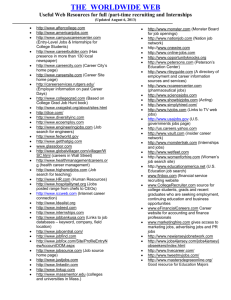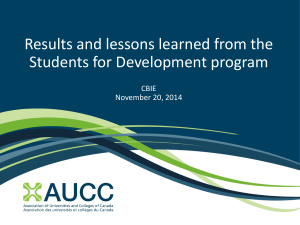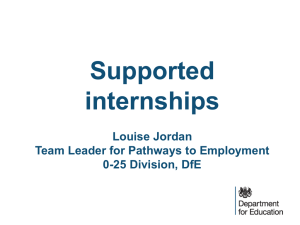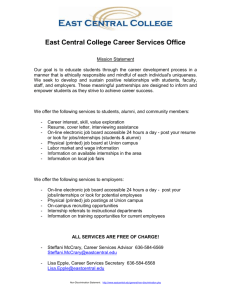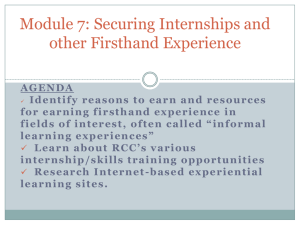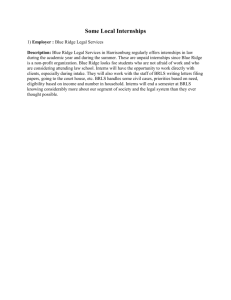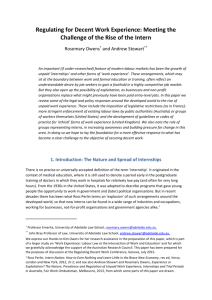AUCC*s SFD Program 2005-12: What were its Development Impacts?
advertisement
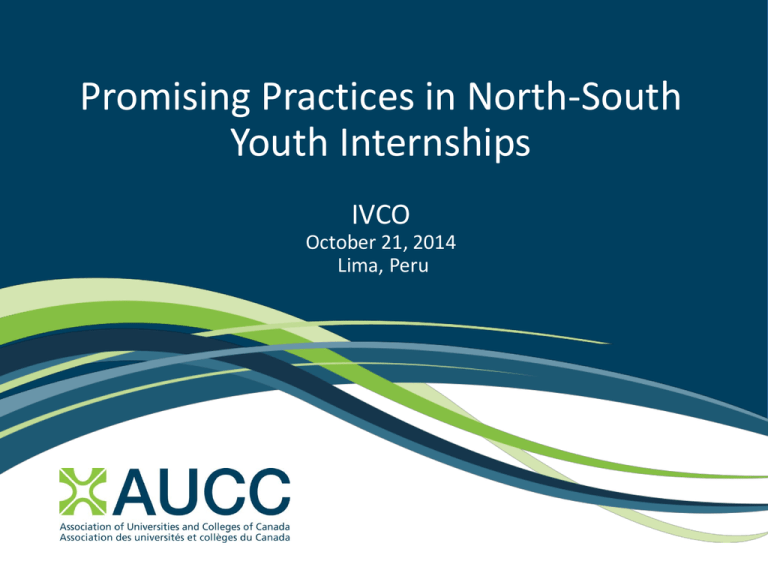
Promising Practices in North-South Youth Internships IVCO October 21, 2014 Lima, Peru Overview • Background • Research findings • Recommendations • Next steps Canadian student mobility context • While student mobility is a priority, most students are looking to conduct academic coursework abroad International experience opportunities offered by Canadian universities in 2012-2013 97% Course work 70% Field schools Service/volunteer opportunities 67% Research 67% Work (incl. co-ops/internships) 66% Developed/developing countries • Although internationalization is a priority for universities, most programs focus on developed countries Research methodology and findings Research questions • Did Students for Development Program (SFD) contribute to development? • What were the benefits and challenges for host organizations, students and universities? • What actions can be taken in future programs to maximize the benefits for all parties? Data collection • Review of 952 questionnaires completed after each internship (2009-2013) • Survey of 2005-2012 alumni (301 resp. of 1,105) • Workshop with 27 Canadian university representatives • Interviews with 12 most active overseas hosts • 2013 monitoring visits – 32 hosts, 70 interns, 6 uni reps Contributions to development: Hosts “The intern was able to make a positive contribution to the needs of our organization.” (952) Disagree 1% 17% Agree Strongly agree 82% Host said interns helped them: • • • • Conduct research and develop policy reports and articles Develop databases, websites and other IT tools Organize and deliver workshops and training Connect with other organizations domestically and internationally • Obtain new sources of funding and materials • Gain new perspectives on their work Challenges: Hosts Recommendations from 69 organizations that hosted 2012 and 2013 interns 74% Improve student preparations Improve match between student skill sets and hosts' needs 48% 13% Lengthen internships Provide more funding to interns and/or hosts 9% Contributions to development: Students “I was able to make a positive contribution to the needs of the host organization.” Disagree Agree Strongly agree 952 questionnaires 3% 25% 301 alumni surveys 3% 6% 72% Strongly disagree Disagree Agree Strongly agree 58% Canadian interns said internships helped them: • Acquire new knowledge, skills, attitudes, and connections • Increase their commitment to development • Increase their employability, often in jobs related to development 34% Contributions to development: Students Alumni continuing to promote awareness and support for development by: 77% Sharing internship experience with others 39% Volunteering with NGOs working in development Participating in fundraising activities for agencies working in development 37% 22% Other Not active in this area 9% Challenges: Students Greatest challenges as an intern (301 alumni) 37% Adapting to a different culture/language barrier 24% Not enough support from Canada or the host 19% Ability to achieve goals/ make contribution 13% The country's challenges/politics 9% Relating to others Illness/health issues Leaving host country/issues upon return 3% 2% 6% Other 4% Don't know/no comment None 2% Contributions to development: Universities “Overall the university is satisfied with the results of this internship.” (560) Disagree 2% 10% Agree Strongly agree 88% Universities said SFD helped them to: • Inspire students to learn about and contribute to development, and in some cases pursue international careers • Lead multi-disciplinary teams on development projects • Link their research and teaching to development goals • Strengthen and expand their international partnerships (spin-off activities) • Attract international students to study in Canada Challenges: Universities • Internships require considerable human/financial resources (at the expense of other activities) • Managing expectations and risks • Ensuring students complete reintegration activities • Facilitating processes for obtaining academic credits Design Recommendations • Develop internships within multi-year projects • Encourage two-way internships and student connections • Program internships of longer than three months when possible • Provide appropriate funding for internships • Encourage stronger partnership between university and Southern partner based on links for ongoing research, teaching and social engagement • Foster clear communications among all parties, especially regarding objectives and expectations • Track outcomes over the long term Next Steps • Continue research on understanding of best practices globally • Hold learning workshop in 2015/2016 • Develop new internship programs Thank you! Gracias! For more information please contact: Philip Landon plandon@aucc.ca Claire Millington cmillington@aucc.ca
